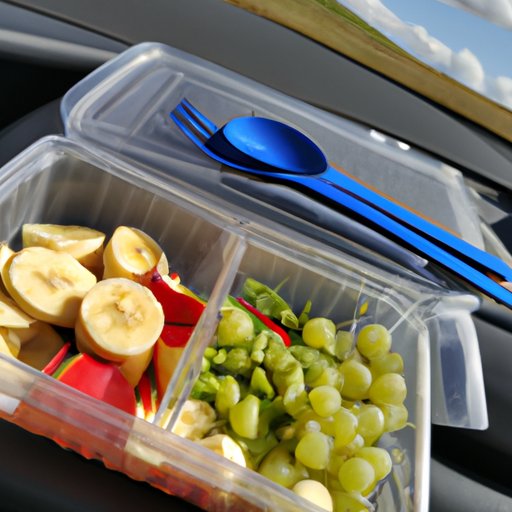Introduction
Travelling can be an exciting experience, but unfortunately, it can also cause digestive issues such as constipation. Constipation is a common gastrointestinal disorder characterized by infrequent bowel movements, hard stools, abdominal discomfort, and bloating. It can be a frustrating condition that affects your overall wellbeing. But why does travelling lead to constipation? In this article, we’ll explore the causes of travel-induced constipation and provide tips for preventing and treating it.
Identifying the Causes of Travel-Induced Constipation
Constipation can be caused by several factors, including dehydration, lack of regular exercise, changes in diet and eating habits, and stress. Let’s take a closer look at each of these potential causes.
Dehydration
Dehydration is one of the most common causes of constipation. When you travel, it’s easy to forget to drink enough water or other fluids, which can lead to dehydration and constipation. According to a study published in the Journal of Clinical Gastroenterology, “The decrease in fluid intake [while travelling] may contribute to constipation.” The researchers found that travelers who drank more fluids were less likely to experience constipation than those who drank less.
Lack of Regular Exercise
When you’re on the go, it’s difficult to find time for exercise. This can lead to physical inactivity, which can cause constipation. A study published in the International Journal of Sports Medicine found that physical activity helps to stimulate and regulate the digestive system, which can help to prevent constipation. So it’s important to make time for exercise while travelling.
Changes in Diet and Eating Habits
Travelling often involves making changes to your diet and eating habits. For example, you may be eating out more often or consuming more processed foods than usual. These dietary changes can lead to constipation. A study published in the journal Nutrition Reviews found that a diet high in fat and low in fiber can increase the risk of constipation. To avoid this, it’s important to focus on eating a balanced diet while travelling.
Stress
Travel can be stressful, and stress can lead to constipation. A study published in the journal Brain, Behavior, and Immunity found that chronic stress can disrupt the body’s natural digestive processes, leading to constipation. So it’s important to manage stress when travelling to reduce the risk of constipation.
Tips for Preventing and Treating Constipation While Travelling
If you’re experiencing constipation while travelling, there are several things you can do to relieve your symptoms. Here are some tips for preventing and treating constipation while travelling:
Increase Fluid Intake
Drinking plenty of fluids is key to preventing constipation while travelling. Aim to drink at least eight glasses of water per day. If plain water isn’t appealing, you can add flavor with slices of fruit or herbs like mint or basil. You can also try drinking herbal teas, fruit juices, and vegetable juices.
Exercise Regularly
Exercise is important for digestive health. Aim to get at least 30 minutes of physical activity per day. If you don’t have access to a gym, try walking, jogging, or biking. You can also try yoga or stretching for a low-impact workout.
Eat High Fiber Foods
Fiber helps to keep your digestive system regular. Try to include high-fiber foods in your diet while travelling, such as fruits, vegetables, whole grains, legumes, nuts, and seeds. Also, avoid processed foods, which tend to be low in fiber.
Manage Stress
Stress can worsen constipation, so it’s important to find ways to manage stress while travelling. Try taking breaks throughout the day to relax and unwind. Practice mindful activities like meditation or deep breathing exercises. And make sure to get enough sleep each night.

How to Eat Healthy on the Road
Eating healthy while travelling can be a challenge, but it’s important for maintaining digestive health. Here are some tips for eating healthy on the road:
Choose Whole Grains
Whole grains are an excellent source of fiber. Look for breads, pastas, and cereals that are made from whole grains, such as oats, barley, quinoa, and brown rice. Avoid refined grains, which are low in fiber.
Include Fruits and Vegetables
Fruits and vegetables are packed with fiber, vitamins, and minerals. Try to include them in every meal while travelling. If fresh produce isn’t available, look for frozen or canned options.
Avoid Processed Foods
Processed foods are often high in sugar, salt, and unhealthy fats, and they’re typically low in fiber. So it’s best to avoid processed foods while travelling. Choose whole, minimally processed foods instead.
The Role of Stress in Travel-Induced Constipation
Stress can worsen constipation, so it’s important to manage stress while travelling. Chronic stress can disrupt the body’s natural digestive processes, leading to constipation. A study published in the journal Gastroenterology Research and Practice found that stress can affect the gastrointestinal tract, leading to constipation. To reduce stress while travelling, try taking breaks throughout the day, practicing mindful activities, and getting enough sleep each night.

Benefits of Prebiotics and Probiotics for Constipation Relief While Travelling
Prebiotics and probiotics are beneficial bacteria that can improve digestive health. They can help to relieve constipation by restoring balance to the gut microbiome. A study published in the journal Nutrients found that prebiotics and probiotics can help to reduce constipation and improve overall digestive health. To get the most benefit, look for supplements that contain both prebiotics and probiotics.
Conclusion
Constipation is a common travel-related health issue. It can be caused by dehydration, lack of regular exercise, changes in diet and eating habits, and stress. To prevent and treat constipation while travelling, it’s important to drink plenty of fluids, exercise regularly, eat high-fiber foods, and manage stress. Prebiotics and probiotics can also help to relieve constipation. By following these tips, you can stay regular and enjoy your travels.
(Note: Is this article not meeting your expectations? Do you have knowledge or insights to share? Unlock new opportunities and expand your reach by joining our authors team. Click Registration to join us and share your expertise with our readers.)
